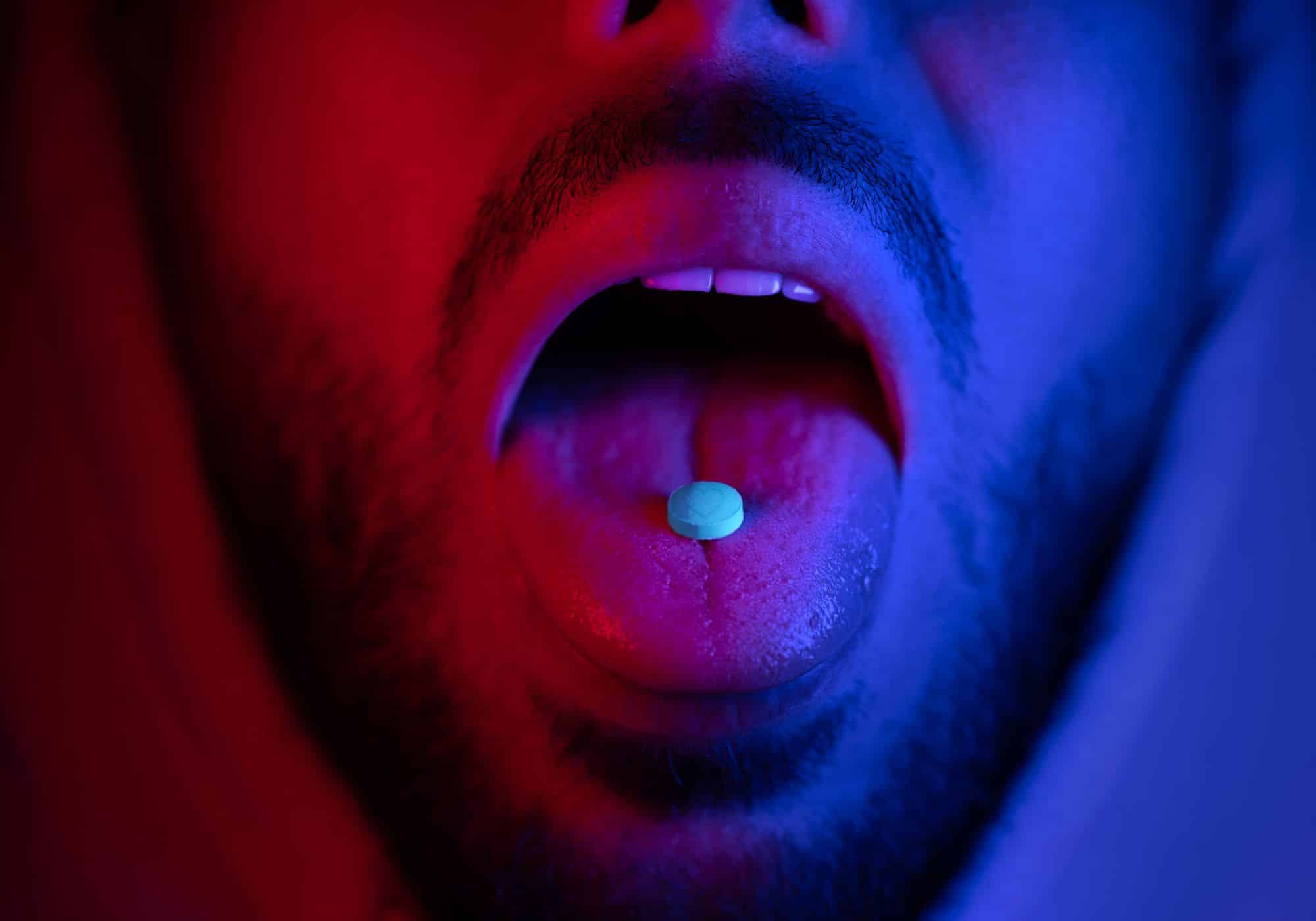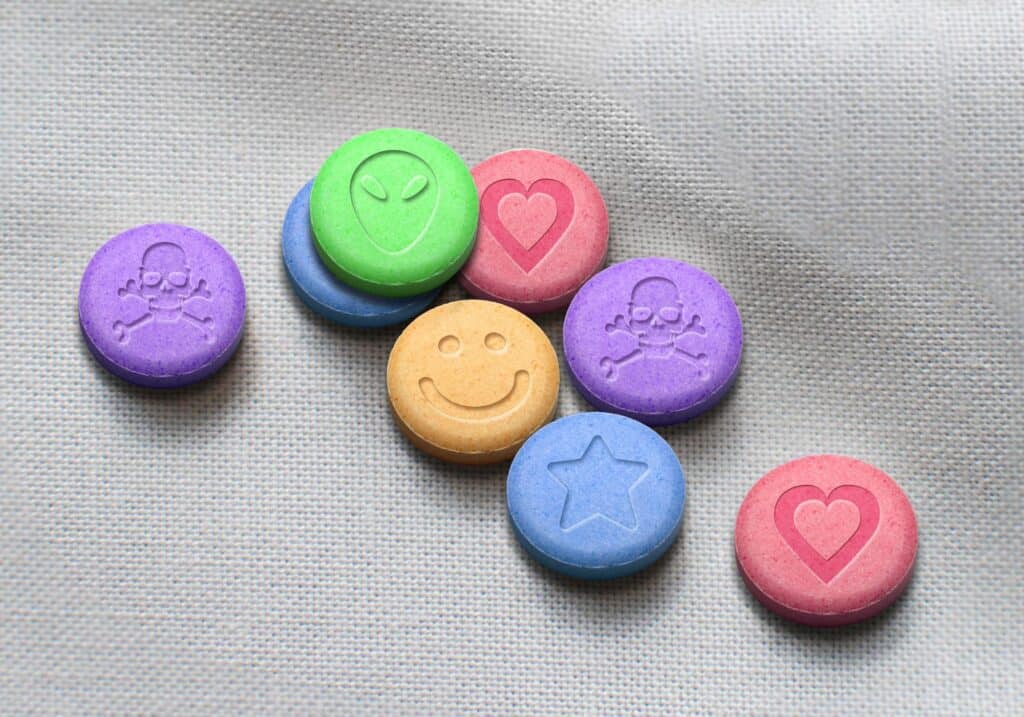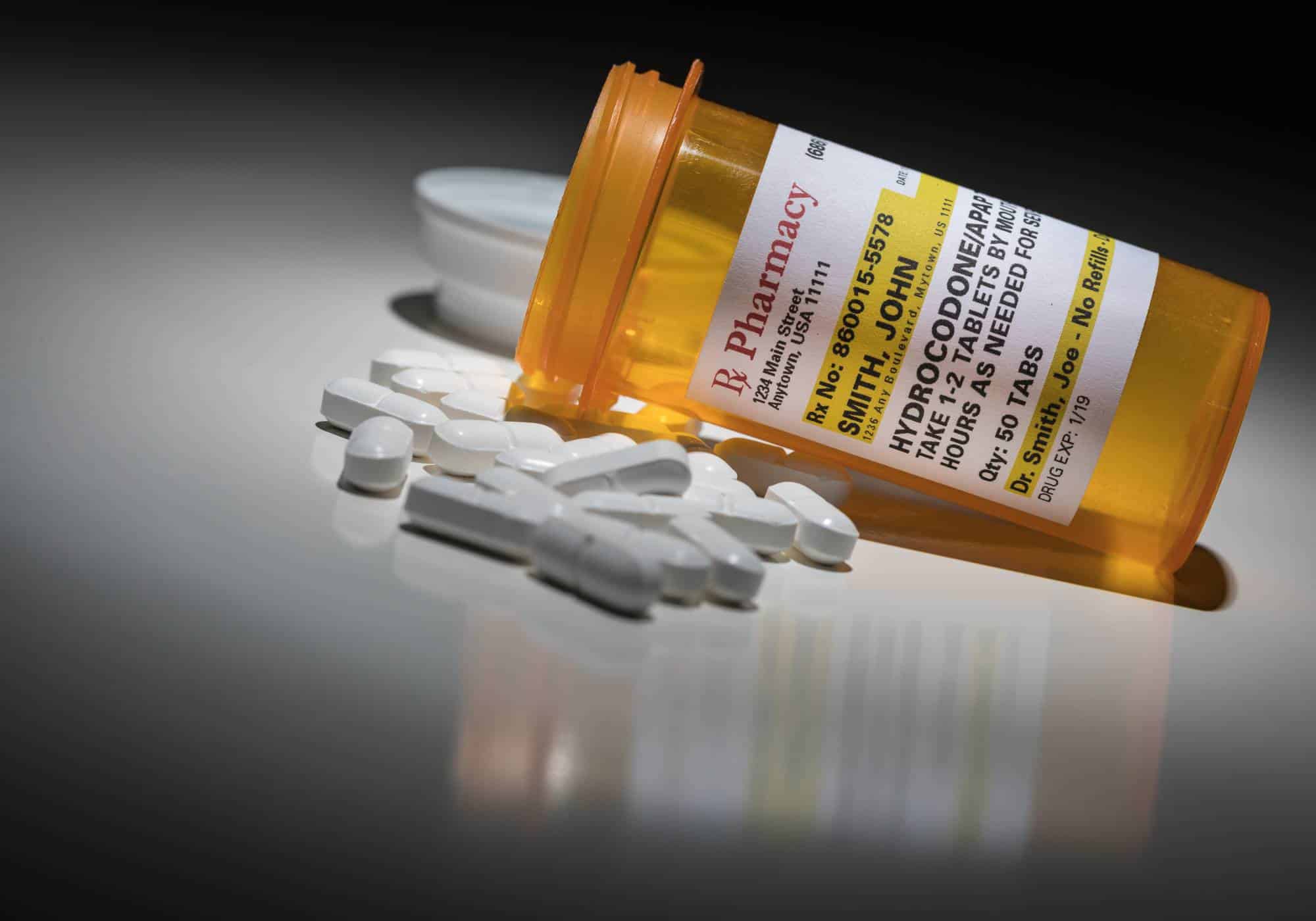What is MDMA (Molly/Ecstasy)?
MDMA, commonly known as ecstasy or molly, is an illegal psychoactive substance. It’s a stimulant with psychedelic properties that has a notable impact on brain neurotransmitters like serotonin, dopamine, and norepinephrine. Those who use MDMA often experience heightened moods, increased empathy, emotional bonding, and an enhanced sensory perception affecting touch, sight, hearing, and taste.
The euphoric effects of MDMA can last up to six hours. However, due to the intense release of serotonin, users may experience significant mood swings and depression as the drug’s effects diminish. Prolonged misuse of MDMA can lead to the deterioration of neurons responsible for producing serotonin and dopamine, potentially causing long-term damage.
Other street names for MDMA are:
- MOLLY
- ADAM
- ECSTASY
- SCOOBY SNACKS
- X
- LOVE DRUG / HUG DRUG
- E
- E-TART
If you or someone you know is struggling with MDMA addiction, it’s important to seek professional help. Addiction treatment specialists, like those at Hope Harbor Wellness, offer dedicated support and guidance for recovery. Call us today at 678-929-6304 to begin your MDMA addiction treatment in Atlanta, GA.
What are the Signs of MDMA Addiction?
MDMA, often used for its euphoric effects, can become addictive. The DSM-5, a widely recognized diagnostic tool, lists several criteria for identifying a hallucinogen use disorder, which applies to MDMA addiction:
- Consuming more MDMA than intended, or for longer periods.
- Unsuccessful efforts to reduce or control MDMA usage.
- Spending a significant amount of time obtaining, using, or recovering from the effects of MDMA.
- Intense cravings or a strong desire to use ecstasy.
- Neglecting responsibilities at work or home due to MDMA use.
- Continued MDMA use despite it causing or exacerbating social or interpersonal issues.
- Giving up important activities because of MDMA use.
- Using MDMA in hazardous situations.
- Persisting in MDMA use even when it contributes to or worsens a health issue, either mental or physical.
- Developing a tolerance, needing more MDMA to feel the same effects.
It’s important to note that withdrawal symptoms for MDMA are not fully recognized in the diagnostic criteria.
MDMA addiction severity is categorized based on these symptoms:
- Mild Addiction: Presence of 2 to 3 symptoms.
- Moderate Addiction: 4 to 5 symptoms are evident.
- Severe Addiction: 6 or more symptoms are present.
Recognizing these signs is crucial for understanding the severity of MDMA addiction and seeking appropriate help. Call us today at 678-929-6304 to begin your MDMA addiction treatment in Atlanta, GA.
Effects of Ecstasy Use
The effects of MDMA, commonly known as ecstasy, typically kick in about 30 to 45 minutes after consumption and can last for 3 to 6 hours. Users often report feelings of emotional warmth, closeness to others, euphoria, increased energy, and heightened sexual arousal. However, ecstasy use isn’t without its downsides. Some of the less pleasant side effects include:
- Nausea and headaches
- Dry mouth
- Decreased appetite
- Visual disturbances
- Involuntary jaw clenching
- Muscle and joint stiffness
- Blurred vision
- Anxiety
- Confused or disorganized thinking
- Paranoia
- Excessive sweating and chills
Moreover, using ecstasy in environments like nightclubs or raves, where there’s heat and intense physical activity such as dancing, poses the risk of hyperthermia, or dangerously high body temperature. This condition can cause dehydration, fainting, seizures, and even organ failure, particularly affecting the kidneys, liver, and heart, if not addressed promptly.
Long-term, heavy use of ecstasy has been linked in some studies to cognitive issues, including memory and learning problems. Additionally, many MDMA users also consume marijuana, which can exacerbate cognitive impairments. The combined effect of both drugs can be more harmful than each one individually.
Why do People Use MDMA?
Many people turn to MDMA, popularly known as ecstasy, to amplify their sensory experiences and enhance their enjoyment in social settings. It’s a common choice at nightclubs or concerts, where the vibrant atmosphere pairs well with the drug’s effects. Users often seek the heightened tactile sensations, increased sexual arousal, and the deep emotional connections it can foster, especially while engaging in activities like dancing.
Signs and Symptoms of Molly Use
Regular use of ecstasy (Molly) can lead to several physical and emotional symptoms that might indicate a need for evaluation for MDMA addiction.
Key Signs and Symptoms of Ecstasy Use include:
- Overheating in Social Settings: Ecstasy stimulates the sympathetic nervous system, leading to excessive sweating and overheating, especially in crowded places like clubs or parties.
- Cognitive and Psychiatric Symptoms: Users of Molly might struggle with memory loss, confusion, and sometimes hallucinations. The intense fluctuation of neurotransmitters caused by repeated use can lead to permanent issues.
- Mood Swings: It’s common for ecstasy users to experience sharp changes in mood, swinging between hyperactivity and sociability to states of lethargy and depression.
Recognizing Paraphernalia Associated with Ecstasy Use
- Mentholated Inhaler and Rubs: People using ecstasy might use vapor rubs, typically meant for cold relief, to enhance breathing and purportedly amplify the drug’s effects.
- Face Masks: Users might apply menthol oils or vapor rub inside masks to inhale the fumes.
- Pacifiers: To prevent teeth grinding, a common side effect, some ecstasy users turn to pacifiers.
- Snorting Tools: Those using MDMA in its pure powder form often have items like razor blades, rolled bills, and mirrors for snorting the substance.
Being aware of these signs and paraphernalia can help in identifying and addressing MDMA use and potential addiction. Call us today at 678-929-6304 to begin your Molly addiction treatment in Atlanta, GA.
Side Effects of MDMA Addiction
Prolonged MDMA use can have significant negative effects on both physical and mental health.
Mental Health Risks
One major concern is the potential development of co-occurring mental health conditions such as depression, anxiety, or even psychosis. These issues can linger long after stopping ecstasy use, especially with high or frequent doses and when mixed with other substances.
Physical Side Effects
Physical issues associated with MDMA addiction include:
- Elevated blood pressure
- Increased heart rate
- Hyperthermia (overheating)
- Seizures
- Potential liver and kidney damage
- Increased risk of cardiovascular problems
MDMA addiction can also lead to various social, economic, and legal troubles.
Short-Term Effects of MDMA Abuse
In the short term, MDMA abuse poses risks like dehydration and overheating due to its impact on the sympathetic nervous system. Repeated use can even result in seizures.
Additionally, MDMA can trigger a cycle of mood swings, leading to anxiety, impulsivity, decreased sexual desire, depression, poor judgment, and aggressive behavior.
Other MDMA short-term effects include:
- Blurred vision
- Reduced appetite
- Nausea and vomiting
- Weight loss
- Hyperactivity
- Muscle cramps
- Teeth grinding
Being aware of these risks is crucial for those using MDMA and for their loved ones, as it underscores the importance of seeking help for addiction.

Dangers of Ecstasy Use
When people use MDMA, there’s a significant risk of unknowingly consuming other substances. This is especially true with ecstasy pills, capsules, tablets, and powders bought illicitly. Users often believe they’re purchasing pure ecstasy, but the reality can be quite different. These products may contain a variety of substances, ranging from methamphetamine, PCP, ketamine, and cocaine, to caffeine, pseudoephedrine, heroin, PMA (par methoxyamphetamine), dextromethorphan (a cough suppressant), and synthetic cathinones, commonly known as bath salts. The accidental consumption of these substances can lead to dangerous, sometimes even fatal, consequences.
From 2017 to 2021, there was a notable increase in the distribution of eutylone, a type of synthetic cathinone, in the United States. This spike raised alarms about an increased risk of overdose, particularly as eutylone was often being sold under the guise of MDMA. Research also indicates that many eutylone-related deaths involve the use of illicitly manufactured fentanyl. In fact, studies suggest that around 1 in 10 deaths involving eutylone in 2020 also had a history of MDMA use, yet no traces of MDMA were found in toxicology reports. This supports the concern that people are inadvertently consuming eutylone and other cathinones, mistakenly believing they’re taking MDMA.
Ecstasy Withdrawal
Ecstasy, or MDMA, is a synthetic drug known for its euphoric effects but can be highly psychologically addictive. MDMA withdrawal occurs when a user stops taking ecstasy, as the brain struggles to adapt without the drug. Regular use of ecstasy boosts neurotransmitters related to happiness and love, but this also depletes the brain’s natural chemicals for these feelings. When users stop taking ecstasy, they often experience withdrawal symptoms, which are typically the opposite of the drug’s effects.
Ecstasy withdrawal symptoms may include:
- Depression
- Confusion
- Anxiety
- Cravings
- Agitation
- Paranoia
- Insomnia
The severity and duration of MDMA withdrawal symptoms vary from person to person and depend on factors like the user’s tolerance, frequency and duration of drug use, metabolism, overall health, age, gender, genetics, and any co-occurring addictions or mental health disorders. Withdrawal symptoms are mostly psychological, though some physical effects can occur. Understanding these factors is key in effectively managing and treating MDMA withdrawal.
MDMA Overdose
Understanding the dangers of MDMA (Ecstasy/Molly) overdose is crucial, especially as its recreational use grows. An MDMA overdose can lead to severe health complications, including irregular heart rhythms, dangerous body temperature dysregulation, and hyperthermia, particularly in high-energy settings like dance parties. Users also risk experiencing rhabdomyolysis, a severe muscle breakdown that can cause kidney damage, and seizures.
Of particular concern is the risk of serotonin syndrome, a life-threatening condition that occurs when MDMA is combined with other serotonin-enhancing drugs. Recognizing these symptoms is vital:
- Rapid Heart Rate
- Extreme Body Temperature Changes
- Muscle Stiffness
- Confusion.
Immediate medical attention is necessary if an MDMA overdose is suspected. Timely and informed action can prevent long-term health consequences and save lives, highlighting the importance of awareness and responsiveness in MDMA-related emergencies. This knowledge is essential not only for users but also for caregivers, medical professionals, and the broader community in promoting safety and health.
How is MDMA Treated?
Young adults are the most vulnerable demographic when it comes to MDMA addiction. Therefore, substance abuse treatment programs tailored to the unique challenges faced by adolescents, teens, and young adults are essential.
Although there isn’t a specific withdrawal syndrome associated with MDMA, treatment typically starts with an inpatient or intensive outpatient program. Key components of MDMA addiction treatment include:
- Counseling: Engaging in one-on-one therapy sessions allows you to delve deep into the specifics of your addiction. Group counseling also offers a supportive environment where you can share experiences and draw strength from peers who are on similar recovery paths.
- Psychotherapy: Cognitive Behavioral Therapy (CBT) is a crucial aspect of treatment. It helps you understand the connection between your thoughts, feelings, and behaviors, and equips you with healthy coping strategies for long-term recovery from MDMA abuse.
- Family Therapy: Addiction affects not just the individual but also their family. Incorporating family therapy in the treatment plan helps mend the relationships strained by substance abuse, fostering a supportive environment for recovery.
It’s also critical to address any co-occurring mental health issues alongside the treatment for MDMA addiction. This integrated approach ensures a comprehensive and effective recovery process.
Common Drug Combinations with MDMA
MDMA, often used to enhance sexual arousal, is commonly combined with various other substances, each mix creating distinct effects:
- Viagra (sometimes referred to as “Sextasy” or “Trail Mix”): This combination is popular for heightening sexual experiences.
- LSD: Pairing MDMA with LSD can intensify hallucinogenic and psychedelic experiences.
- PCP: Combining MDMA with PCP can lead to more pronounced hallucinations and altered states of consciousness.
- Mushrooms: Mushrooms and MDMA together can amplify the sensory and psychedelic effects.
- Ketamine: Mixing these can produce a trance-like state, with enhanced tactile sensations.
- Amphetamine: This combination can increase energy and alertness but may also lead to extreme exhaustion.
- Mescaline: The combination with mescaline can result in intensified visual and sensory experiences.
- Alcohol: Drinking alcohol while taking MDMA can increase the risk of dehydration and other adverse effects.
It’s important to note that mixing MDMA with these substances can not only intensify the experience but also significantly raise the risk of harmful or even deadly consequences.

Ecstasy Addiction Treatment and Rehab
Though specific medical treatments for ecstasy addiction aren’t available yet, behavioral therapies similar to those used for other substance use disorders can be effective. Here are some common approaches to ecstasy addiction treatment:
- Detoxification: This process involves using medications and other interventions to safely manage withdrawal symptoms, ensuring the individual remains as comfortable as possible.
- Inpatient or Residential Care: This treatment takes place in a residential facility or hospital, providing round-the-clock monitoring. It typically includes individual and group counseling, educational sessions, and behavioral therapies like cognitive-behavioral therapy (CBT). CBT is particularly effective, helping individuals understand and change the thought patterns and behaviors that contribute to ecstasy misuse, as well as developing skills to manage stress and prevent relapse.
- Outpatient Services: MDMA Outpatient programs offer similar treatments to inpatient care, but allow individuals to return home or to a sober living environment each day. The frequency and intensity of sessions vary based on each person’s needs, ranging from weekly to several hours multiple times per week.
- Aftercare: Continuing care post-treatment is crucial for maintaining sobriety. This might include follow-up programs, alumni support networks, ongoing counseling, mutual-help groups, and group therapy sessions.
Insurance may cover part of the treatment costs. If you or someone you love is struggling with MDMA addiction or misuse, contact Hope Harbor Wellness today at 678-929-6304.
Comprehensive MDMA Addiction Treatment at Hope Harbor Wellness
At Hope Harbor Wellness, we offer specialized MDMA addiction treatment in Atlanta, GA designed to empower individuals towards a life free from dependency. Recognizing the often intertwined nature of substance use and mental health disorders, our approach includes dual diagnosis treatment. This is vital as the 2021 National Survey on Drug Use and Health indicates that 17.9 million adults over 18 have concurrent substance use and mental health issues.
Our multifaceted treatment strategy for Ecstasy addiction encompasses:
- Individual and Group Therapy: Providing personal and collective support and insight.
- Family Therapy: To repair and strengthen family dynamics affected by addiction.
- Recovery Residences: Safe and supportive living environments for those in recovery.
- Holistic Therapy: Including methods that address overall well-being beyond traditional therapy.
- Genetic Testing and Red Light Therapy: Innovative approaches to support recovery.
- Cognitive Behavioral Therapy (CBT) and Dialectical Behavior Therapy (DBT): Evidence-based therapies to change negative thought patterns and improve emotional regulation.
- Peer Support: Encouragement and understanding from others in recovery.
- Relapse Prevention and Healthy Coping Skills: Tools to maintain long-term sobriety.
- Psychoeducation: Increasing awareness about addiction and mental health.
- Recreational Therapy: Engaging activities that promote healthy living.
- Partial Hospitalization Program (PHP): Intensive outpatient care for more severe cases.
- Intensive Outpatient Program (IOP): Flexible treatment options for those balancing recovery with daily commitments.
- Post-Recovery Program: Ongoing support to sustain the progress made in treatment.
At Hope Harbor Wellness, our commitment is to tailor treatment plans to the unique needs and goals of each client. Our continuum of care from intensive outpatient programs to post-recovery support ensures sustained wellness and recovery. Call us today to start your Ecstasy addiction treatment in Atlanta, GA.
MDMA Addiction Treatment Frequently Asked Questions
What Does MDMA Stand For?
MDMA stands for 3,4-methylenedioxymethamphetamine. It’s a synthetic drug in the amphetamine family, acting as a stimulant and hallucinogen. Known as Molly, Ecstasy, or XTC, it boosts serotonin, dopamine, and norepinephrine levels in the brain, inducing euphoria and emotional closeness. Despite its recreational popularity, MDMA poses risks like addiction and memory issues.
What Does MDMA Look Like?
MDMA, or ecstasy, typically comes as small, pill-shaped tablets in various colors and designs, often with distinctive logos. It’s also sold as powder or crystals. However, illicit ecstasy tablets might contain harmful impurities and other substances.
Can You Get Addicted to Ecstasy?
Yes, it’s possible to develop an addiction to ecstasy. Regular use often leads to psychological dependence, driven by the drug’s mood-enhancing effects.
Is MDMA (Molly/Ecstasy) Addictive?
While research hasn’t definitively established how addictive MDMA is, it does affect neurotransmitters similar to other addictive substances. Animal studies show a tendency to self-administer MDMA, a common indicator of addiction potential, though less so than with drugs like cocaine. Both human and animal studies indicate that prolonged MDMA use can alter dopamine and serotonin systems linked to addictive behavior.
Is MDMA Physically Addictive?
MDMA is primarily psychologically addictive rather than physically addictive. It affects mood and emotions, leading to psychological dependence rather than physical withdrawal symptoms.
Why is Ecstasy Addictive?
Ecstasy is addictive because it releases high levels of serotonin, creating feelings of happiness, emotional closeness, and pleasure. This rewarding experience can lead to repeated use and psychological dependence.
How Addictive is MDMA?
MDMA’s addictive potential is moderate compared to other drugs, but it can be habit-forming. Regular use can lead to psychological dependence due to its euphoric and emotional effects.
How Long Do the Effects of MDMA Last?
The effects of MDMA can last between 3 to 8 hours, varying by individual, dose, and administration method. Effects typically start within 30 to 45 minutes of intake, peaking in 1 to 2 hours. Users experience euphoria, empathy, and energy, followed by a comedown phase marked by fatigue and irritability.
Can You Treat Ecstasy Addiction with Pharmaceutical Treatments?
Currently, there are no specific pharmaceutical treatments approved for ecstasy addiction. Treatment usually focuses on behavioral therapies, counseling, and support systems to address psychological dependence.










